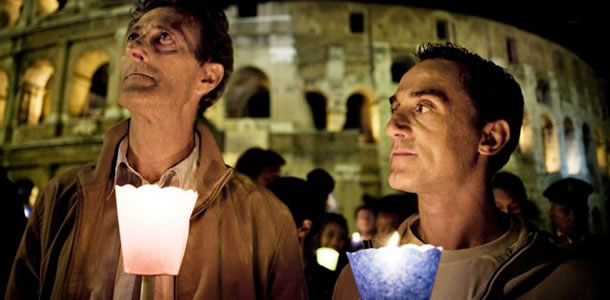Title: Reality
Oscilloscope Laboratories
Director: Matteo Garrone
Screenwriter: Maurizio Braucci, Ugo Chiti, Matteo Garrone, Massimo Gaudioso
Cast: Aniello Arena, Loredana Simioli, Raffaele Ferrante, Nando Paone
Screened at: Review 1, NYC, 3/7/13
Opens: March 15, 2013
Most people will turn their heads even in New York if Robert De Niro, Al Pacino or Tom Cruise passed by on the street. Americans, like people the world over, are attracted by celebrity, particularly since here in the U.S. more people have TVs than bathtubs. We’re all an audience. But how many people seriously think that they can themselves become famous, so much so that people will turn their heads when they walk down the street? Probably most give it a moment of thought, but the principal character of Matteo Garrone’s “Reality” becomes so convinced that he is about to be the kind of guy who’d have to chase away the paparazzi that he loses touch with reality, conducting himself in such a way that his devoted wife is at her wit’s end while watching her main man self-destruct.
“Reality” shifts between comedy and drama, weighing more toward the latter, which is not unusual since its director, Matteo Garrone, is best known for his strikingly melodramatic “Gomorrah,” a Neopolitan mob film that exposes Italy’s underbelly by showing five individuals making a compact with the area’s mafia. “Reality,” like “Gamorrah,” won the Grand Prix after its showing at the Cannes Film Festival, the latter being in my opinion the more striking motion picture.
Garrone may have been inspired by the Hollywood picture “The King of Comedy,” Martin Scorsese’s comedy-drama that explores the lengths to which a nobody will go to be as famous as his idol. In that American version, Rupert Pupkin thinks that one appearance on the Johnny Carson show will be his ticket to stardom, though unlike anything that occurs in “Reality,” Pupkin kidnaps the producer demanding as ransom the TV appearance that will turn his fantasy into reality.
Garrone contrasts a lavish opening scene of an expensive wedding with the poverty of the average Neopolitan family. The wedding features a coach with two dancing horses escorting the bride and groom into an applauding roomful of invitees, with actor Luciano (Aniello Arena) performing as a drag queen with Enzo (Raffaele Ferrante), an Italian celeb. Luciano makes ends week together with his partner Michele (Nando Paone) in a fish stand in Naples’ old city while running a scam on the side with his wife Maria (Loredana Simioli) selling kitchen robots. Enzo helps Luciano audition for an Italian version of “Big Brother,” a reality that had been founded by John de Mol and which allows viewers to vote by phone on which residents of a filmed house should be evicted. When Luciano auditions at Rome’s Cinecittà studios, he’s sure he made enough of an impression to have the producers overlook scores of people lining up for an opportunity to appear on the show. So convinced is he, and so sure that the show has sent scouts to vet Luciano’s character, that he gives away his own furniture to the poor and sets up a soup kitchen for them.
Garrone is at his best when honing in both the haute-bourgeois characters in the beautifully photographed opening wedding scene, contrasting them with the lower middle-class population of the Neopolitan area, many of whom are obese, and all assumed to be members of Luciano’s extended family. He is encouraged by many in the town, though not by at least one woman who is victim of the scam and who loudly demands her money. Only Luciano’s wife provides a dose of reality, trying to convince her husband that the odds of being chosen work against him.
The movie may be criticized by some for not finding a unified tone, shifting from broad comedy to serious drama, but Garrone overcomes audience doubts by seamlessly weaving in the comic with the melodramatic. Perhaps even more interesting than the entire picture is the fact that the lead performer, Aniello Arena, was discovered from a prison troupe (something like what goes on in Pablo Taviani’s 2012 film “Caesar Must Die,” wherein a group of prison theps prepare to stage “Julius Caesar” before a crowd of upscale theater-goers). Arena is currently serving a twenty-to -life term for two murders, giving him a dose of fantasy come true as he performs in Rome and Naples presumably with prison guards lurking nearby off camera.
Unrated. 115 minutes © 2013 by Harvey Karten, Member, New York Film Critics Online
Story – B
Acting – B+
Technical – A-
Overall – B+

